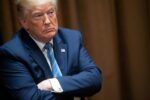US ex-spies warn of danger in ‘warfare’ between Trump, intel chiefs
(SAUL LOEB)
Washington (AFP) – The critical relationship between President Donald Trump and the US intelligence community is irreparably broken, with high risks for the country in a crisis, former senior CIA officers said Wednesday.
One week after Trump blasted his spy chiefs as “naive” and told them to “go back to school” for challenging his views on Iran and North Korea, the CIA officers said the rift between the two sides had become extremely dangerous.
“When you have that open warfare, it can affect intelligence judgments and it can affect policy judgments,” said George Beebe, former director of Russia analysis at the CIA.
When the intelligence community needs to deliver a warning to the president of a looming crisis, he said, you now have a situation where “the first thought going through his mind is, ‘they are playing some game to try to make some trouble for me.'”
“If the intelligence community warns, but its audience for that warning won’t hear it, dismisses it, effectively, the result is not different than if there were no warning at all,” he said.
– Dispute over global threats –
Beebe and other ex-Central Intelligence Agency officers were speaking at a roundtable discussion at the Center for the National Interest, a Washington think tank, following the newest public rupture between Trump and his intelligence chiefs.
Their annual Worldwide Threat Assessment presented to Congress on January 29 contradicted Trump’s claims that the Islamic State group has been defeated, that North Korea will forego its nuclear weapons, and that Tehran is actively seeking nuclear weapons.
Trump blasted back that they were wrong, before summoning Director of National Intelligence Dan Coats and CIA Director Gina Haspel to his office over the issue.
“The Intelligence people seem to be extremely passive and naive when it comes to the dangers of Iran. They are wrong!” he tweeted.
“Perhaps Intelligence should go back to school!”
Trump has been at odds with the intelligence community since its public report after his November 2016 victory that Russia had meddled in the election on his behalf.
He branded the report “politicized” and “fake news” and later accepted Russian President Vladimir Putin’s insistence that there was no meddling.
“Lots of presidents have fallen out of love with us over time,” former CIA assistant director for analysis Mark Lowenthal said.
“But the relationship with Trump is different. We have never had a president stand up with a foreign leader, let alone a Russian leader, and say I believe him, I don’t believe US intelligence.”
Lowenthal said Trump’s distrust has been “very debilitating” for intelligence analysts, potentially affecting their judgment.
– Crisis test –
Paul Pillar, a Georgetown University professor who spent 28 years in the CIA, stressed that setting US policy is president’s prerogative.
But, he said, Trump needs the intelligence community’s input into his policy.
“The biggest concern seems to be Trump’s overall resistance to ingesting new information, in either written or briefing form, and thereby overcoming his ignorance about many world events,” said Pillar.
“He has not really been tested with a true international crisis,” he added.
“This is another thing to worry about: that the intelligence input would be discredited, it would be seen with suspicious eyes, and that would impede an effective and safe response to whatever the crisis is.”
Disclaimer: This story is published from a syndicated feed. Siliconeer does not assume any liability for the above story. Validity of the above story is for 7 Days from original date of publishing. Content copyright AFP.


